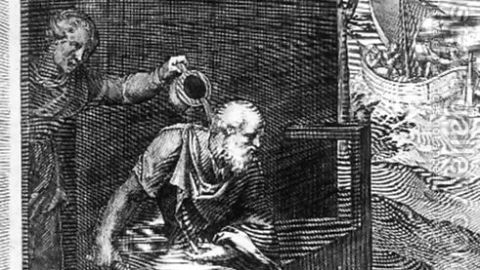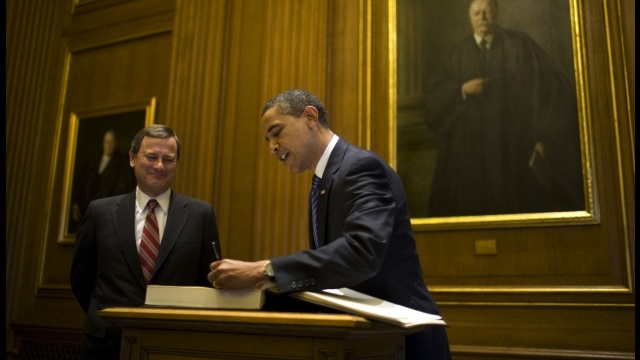Being Old in a Democracy

So we really do have an aging society. The good news, as I’ve said before, is that we’re living longer, on average, than ever before. The bad (some say) is that we have fewer children.
These are the best and worst times to be old. Medical care, of course, is better than ever. Sophisticated and prosperous people know better how to take care of themselves, and they’re taking responsibility, maybe like never before, for their health and safety. For some, seventy really is the new fifty.
But, as Socrates first explained in Plato’s Republic, democracies in particular have trouble figuring out what old people are for.
Democracy, said Socrates, is all about freedom or the absence of compulsion. If all people are equal, then all desires and ways of life are equal. So the moral principle of democracy is nonjudgmentalism.
The ranking part of the soul Socrates calls spiritedness. People angrily or at least seriously demand personal significance, and they pursue it through various forms of excellence or demanding self-restraint. They want to be more than their desires, or at least they want to rank their desires according to some higher principle or purpose.
Spiritedness or pride democrats call repression. They liberate desire from spiritedness, and so they, according to Socrates, become deeply pro-choice when it comes to everything people think and do.
That means the democratic life claims to be free from the obsessions of order and necessity. Democrats claim to be free to do whatever they want whenever they want. They understand their lives as a series of hobbies, without the order and direction that come from love and death, and so from productivity, parenthood, citizenship, community, friendship, truth, and self-defense.
The same freedom of the democratic way of life Socrates describes Marx describes as communism in The German Ideology. The difference between Socrates and Marx is that the latter took his description seriously as perfectly desirable and as our more or less inevitable future—a world in which religion, the state, the family, and so forth would have withered away.
For Socrates, pure democracy is in some respects desirable and in others ugly self-denial, and he was clear enough that it’s unsustainable in real life. From his point of view, we should be worried that our way of life become too democratic, meaning too comprehensively pro-choice or too promiscuously libertarian.
The cure to what ails democracy is usually less democracy. That means the cure is more oligarchy (or disciplined concern for the production of wealth), more timocracy (or high-minded concern for honor or nobility), and more aristocracy (or more concern for merit, excellence, or the rule of wisdom). Every real democratic country counts on being mixed with these undemocratic “regimes” for its security and moral goodness.
The ugliness of democracy is its unrealistic denial of the inevitability and even the goodness of personal death and personal authority. The easiest and maybe the truest criticism of Marxism is about its idea that capitalism—or liberated techno-productivity—could ever overcome natural scarcity. The scarcity that always remains is scarcity of time. Under communism, people will remain self-conscious and mortal.
That means they will remain to some extent obsessive and repressed, and they’ll be stuck with ranking their activities or choices with the scarcity of time (if nothing else) in mind.
So in a democracy, young people are particularly repulsed by old people. They remind them of death, the death that comes to us all. As Socrates explains and we observe, in a democracy the old do everything they can to look young and imitate the ways of the young. They do everything they can not to be disagreeable or unpleasant. That’s why, in our time, they nip, tuck, botox, and so forth.
And they don’t get any respect. Nobody believes, in a democracy, that wisdom comes with age, and, in any case, nobody respects wisdom or even the “truth.” The same goes with the authority that comes from tradition or with family. Old people become nothing but inferior young people, people, unlike the young, in so many ways obviously limited and diminished by necessity. That’s why we’re increasingly about warehousing the very old where we can’t see them.
In a democracy, Socrates says and we observe, experienced teachers fawn over their pupils,and we become accustomed to the absurdity that students are qualified to evaluate their teachers.
The ugliness of the democracy is displayed in its denial of the wisdom that comes with age, in its denial that being old will happen to us all (if we’re lucky). So the ugliness of democracy is displayed in finding no truth or beauty in being old.
Socrates, we remember, almost begins The Republic by asking an old man what it’s like to be old. And he seems to learn that there’ s little worse than being old and poor in a democracy. A downside of being old in America today is that people have more and more reason to fear that their money won’t last as long as they do.
Still, being old in a democracy is a problem that more people than ever are lucky to have. We have to think more clearly about the virtues required to live well with being very old. The studies actually show that being loved is more important, even when it comes to medical outcomes, than being rich.





